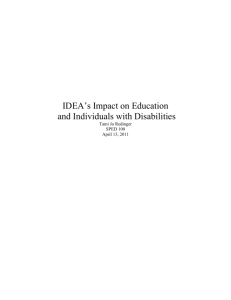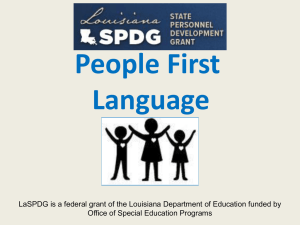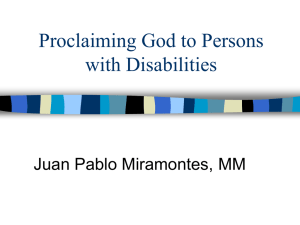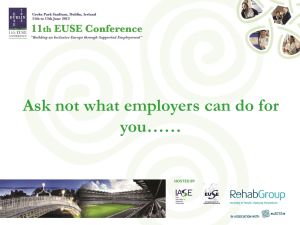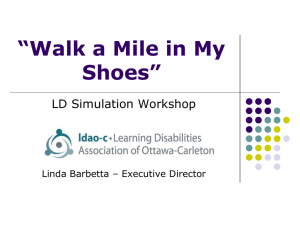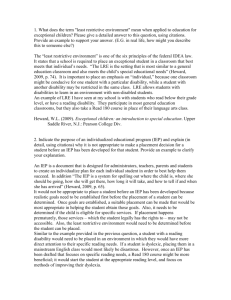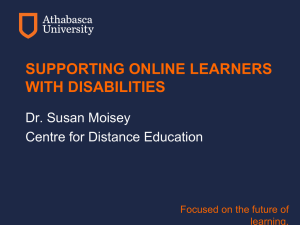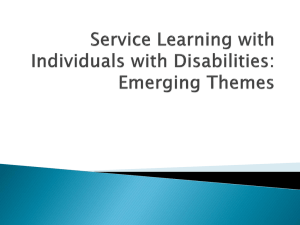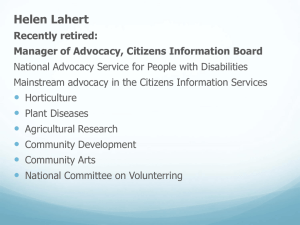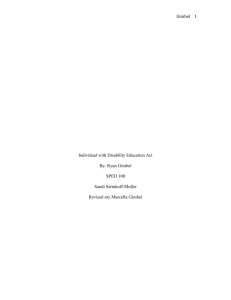Chapter 13 Neutralization of special education
advertisement
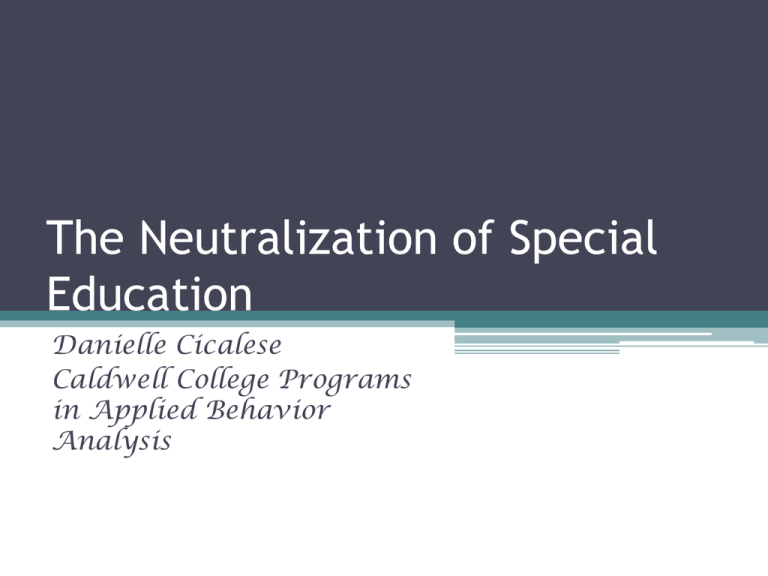
The Neutralization of Special Education Danielle Cicalese Caldwell College Programs in Applied Behavior Analysis Authors • William L. Heward • Ohio State Univ. since 1975 • Interests are “low tech” teaching for increasing student responses • Promoting generalization and maintenance skills • Susan M. Silvestri • PhD in Special Education from Ohio State Univ • MA in Behavior Disorders from Columbia University • New England Center for Children What is Neutralization? • Neutralize- To counteract, nullify or destroy the force, influence, effect, etc, of; render ineffective (Heward & Silvestri) The History of Special Education in the USA • In 1948 only 12% of children diagnosed with mental retardation received formal education • In 1962, 16 states adopt laws to provide educational services to children with mental retardation diagnosis • Today over 6,000,000 children are receiving special education services in the US alone Where did this change evolve from? • Architectural Barriers Act of 1968, • Rehabilitation Act of 1973, • Education of All Handicapped Children Act of 1975 (later updated and renamed the Individuals with Disabilities Education Act, IDEA), • Americans with Disabilities Act of 1990 (ADA). Legislation • • • • • Due Process Informed Consent IEP “Contract” Litigation Appeals Who qualifies for Special Education under these Acts? • http://www.youtube.com/watch?v=A6fcIqUHz8Q&feature=related Special Education • Society’s response to civil rights and the needs of those with disabilities. Its is a multidisciplinary field whose practices are influenced, not only by education, but by social, cultural, economic, medical, technological, and legislative trends (Heward, 2003). • Dictionary meaning: education that is modified or particularized for those having singular needs or disabilities, as handicapped or maladjusted people, slow learners, or gifted children. Educational Outcomes for Current Students Nationwide Statistics Special Education “Regular” Education School Completion 66%learning 48% behavior 83% Employment (5 yrs post grad) 71% learning 47% behavior 69% Independent Living (5 yrs post grad) 44% learning 40% behavior 60% Postsecondary Education Attendance 30% each learning and behavior 68% Other Patterns Apart from these outcomes, very little is known about the progress of special education students during their school years. Some information is available on where students receive their education; more students every year receive their education in regular classrooms. Why? Lack of knowledge? Bad Teachers? NO • “testament to educations collective failure to systematically implement available knowledge; research-based teaching practices is hampered n part by widely held beliefs about the nature of teaching and learning that support incompatible and weak instructional practices” (Hewerd & Sylvestri) • http://www.youtube.com/watch?v=_KZPzbMqdnQ&feature=related Real Purpose of Special Education “ provide instructionally based interventions designed to prevent (early intervention), eliminate (remedial instruction), and overcome (compensatory instruction) the obstacles that might keep an individual with disabilities from learning and from full and active participation in school and society. (Hewerd & Sylvestri) Best or Worst Practice WORST Do not teach toward any predetermined corpus of knowledge or curriculum objectives (and by all means, do not directly or intensely focus on specific skills). With support and encouragement, children will naturally discover and learn what they need to know. BEST Assess each student's present levels of performance to help identify and prioritize the most important instructional Targets. “Special education is individually planned, specialized, intensive and goal-directed instruction. When practiced most effectively and ethically, special education is also characterized by the use of research-based teaching methods, the application of which is guided by direct and frequent measures of student performance” (Heward, 2003a). Is this in line with IDEA’s goals and definition of special education? IDEA definition of Special Education IEP must contain: • (4) A statement of the special education and related services and supplementary aids and services, based on peer-reviewed research to the extent practicable, to be provided to the child, or on behalf of the child, and a statement of the program modifications or supports for school personnel that will be provided to enable the child— • (i) To advance appropriately toward attaining the annual goals; • (ii) To be involved in and make progress in the general education curriculum in accordance with paragraph (a)(1) of this section, and to participate in extracurricular and other nonacademic activities; and Research has produced significant and reliable teaching practices ▫ ▫ ▫ ▫ Functional assessment Tactical procedures (i.e. constant time delay) Embedding opportunities for language learning Low tech methods (i.e. response cards, guided notes ▫ Peer-mediated instruction/peer tutoring ▫ Facilitate generalization/ maintenance ▫ Learning strategy instruction “Closing the Research-to-Practice Gap” • Ramp Up Studies/more studies • Deal with Resistance • Numerous studies are implicating that the effective methods with much research behind them are still not being used. Example of Illogical Beliefs • Why People Believe Weird things, Michael Shermer (1997) • Hewerd lists 10 “weird and widely believed” Structured Curricula Impede True Learning (Children Must construct their Own Meanings) Targeting Specific Skills for Instruction Precludes Authentic Learning • Quartz • Limestone= • Rock Collection Measurement is Unnecessary (It May Even Be Harmful to Student Learning) Eclecticism Is the Best Approach • • • • (At a superficial level, this seems logical) Problem arises when eclecticism outweighs research based methods Misplaced view that every approach has validity Mixed model may prevent consistency and intensity Teacher may not feel they have “mastered” a certain style of teaching, they may not feel confident in abilities Creativity Is the Key to Teacher Effectiveness • Creative Doctors? • Creative Pilots? • Creative Teachers? • Is one more important then the other? The consequences of Illogical and Unfounded Beliefs: Direct Consequences for Students: Active Harm by sins of Commission • Require students to learn knowledge that is not compatible with adaptive knowledge • Misplaced emphasis on self esteem Indirect Consequences for Students Benign Neglect by Sins of Omission • Nothing Happens! • Lowered expectations • Less opportunity Students with disabilities can learn, but they learn more slowly than typical students; therefore instruction should occur at a slower pace and they should be given extra time. True or False? What About the Teachers? • Praise or Not to Praise • Keeps profession “immature” • Teachers seen as: ineffective, stagnant and lack respect in the field by other professionals Man prefers to believe what he prefers to be true. -Francis Bacon Change the World Not The Student • Deconstruction of Disability http://www.youtube.com/watch?v=b6zVw l6i1UY&feature=related From Amelioration to Accommodation • 1970-80s view of Spec. Ed. was to ameliorate the affects of the disability • Likely impact use of PECS with children on the spectrum • It is possible to have both, yet amelioration best fits IDEAs goal directed dimension of Special Education Advocates for Ideologically based practices will often use persuasive writing to convey the “rightness” of their “beliefs” 1. 2. 3. 4. 5. 6. 7. Authentic Cooperative Creative Whole child Integrative Open-system Self-organizing Also using descriptions for practice like: 1. 2. 3. 4. 5. 6. Mechanistic Top-down narrow Simplistic Fragmented Competitive Which Witch is Which? Philosophy based School Systems • Founded on beliefs and philosophy • Theories instead of research lead the field • Fears that science will bring to much change • Belief that what has been must continue • Believes in the “natural” ideology Dracula • Founded in beliefs and religious philosophy • Theories instead of research lead the quest for truth • Fears that science will bring to much truth • Belief that what has been must continue • Believes it’s “natures” way Bringing up the Roots • Philosophical roots of education are deep! • Confusion for new grads Changes are being made Four Attitudes of Professional Practice 1. 2. 3. 4. Strive for an Optimistic Realism Depend on a Responsible Empiricism Maintain a Healthy Skepticism Maintain a Focused Pragmatism Conclusion Being a Special Education teacher is hard work Being a great Special Education teacher is research-based hard work! Dictionary, W. N. (2006). Retrieved from Sciencemadesimple.com. References Jacobson, J.W., Foxx R.M., & Mulick, J.A. (Eds.). (2005). Controversial Therapies for Developmental Disabilities: Fad, Fashion, and Science in Professional Practice. Dictionary, W. N. (2006). Retrieved from Sciencemadesimple.com.


